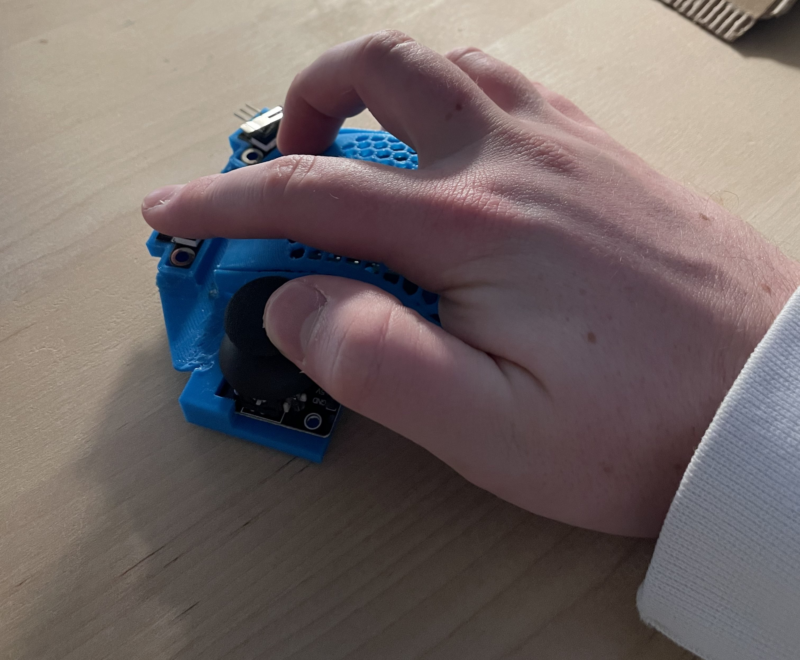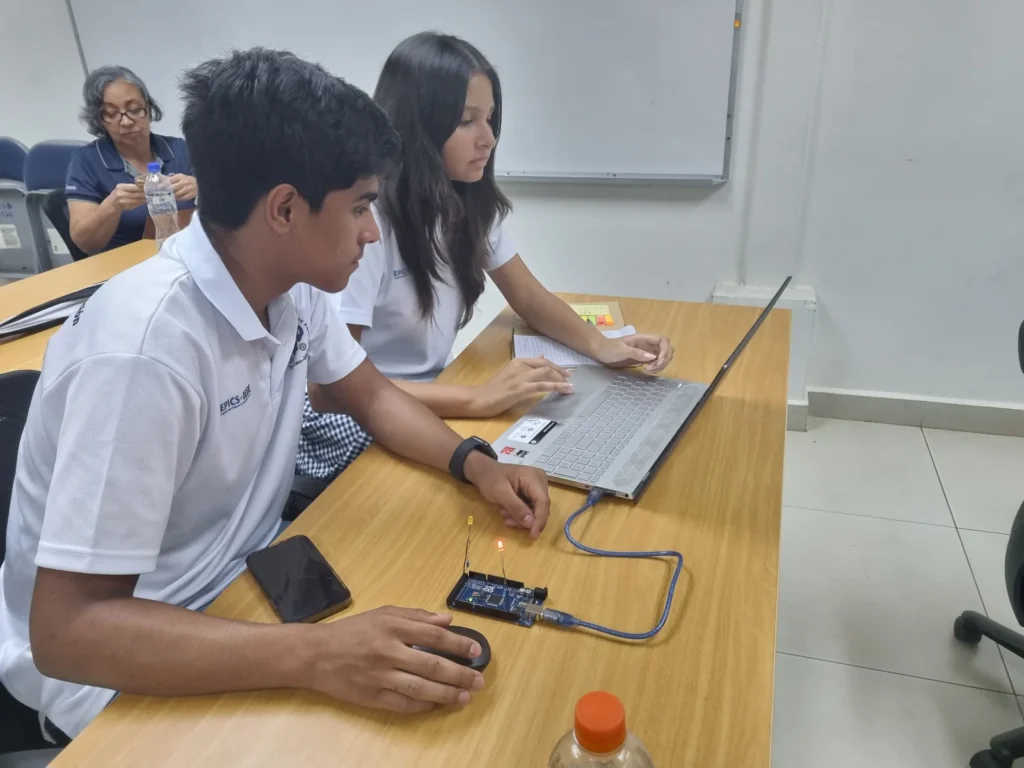In a world the place over 1 billion individuals dwell with disabilities, the necessity for revolutionary accessibility options has by no means been better. The EPICS in IEEE Entry and Skills Competitors, held in 2023, showcased the ingenuity and compassion of engineering college students worldwide as they tackled urgent accessibility points. Let’s dive into a few of the groundbreaking initiatives that emerged from this competitors.
Adaptive Gaming Mouse: Leveling the Enjoying Area
On the College of Florida, a group of 10 biomedical engineering college students got down to make gaming extra accessible. They developed an adaptive mouse that combines keyboard capabilities right into a single machine, permitting people with hand or arm abnormalities to sport with only one hand. The group’s inspiration got here from John McCauley, a junior who acknowledged the struggles confronted by avid gamers with disabilities.

“Some avid gamers with arm or hand deficiencies play with their ft, nostril, mouth, or elbows, or they use gadgets not meant for that function and are pressured to adapt,” McCauley defined. The group’s 3D-printed mouse integrates components from keyboards, Logitech mice, and Xbox controllers, creating a flexible gaming device. With their $1,000 grant, they constructed 5 gadgets set to be delivered to recipients by means of Palms to Love, a Florida-based group supporting kids with higher limb abnormalities.
Facet Notice: Microsoft not too long ago launched varied free adaptive 3d printed adaptive thumbstick toppers for disabled avid gamers.
Campus Accessibility: A Holistic Method
In Panama, a collaborative group of 15 undergraduate college students from the Universidad Tecnológica de Panamá and 24 highschool college students from Chiriquí took on the problem of constructing their campus extra accessible. Their multifaceted method addressed varied points of campus life:
- Braille Signage: Utilizing 3D printing expertise, the group created braille indicators to enhance navigation for visually impaired people.
- Personalized Wheelchair: The scholars designed and constructed a customized wheelchair, tailoring mobility options to particular consumer wants.
- Automated Doorways: The group automated doorways within the engineering division, enhancing entry to school rooms and corridors for college students with mobility challenges.

Highschool junior Gael Villarreal emphasised the venture’s broader impression: “This venture can be very helpful, particularly [in Panama], the place buildings haven’t been tailored for individuals with disabilities.” Past bodily modifications, the venture fostered invaluable delicate abilities amongst individuals. As one other group member, Gianny Rodriguez, famous: “I discovered that that you must have new experiences, be sociable, meet and get together with new individuals, and work as a group to achieve success.”
With their $8,100 grant, the group not solely applied these improvements but in addition invested in group coaching, making certain long-term impression and efficient utilization of the brand new accessibility options.
Empowering the Listening to Impaired: Language Studying Kiosk
In Chennai, India, college students from the SRM Institute of Science and Expertise addressed a crucial want for kids with listening to impairments. They developed a kiosklike machine to assist younger learners purchase Tamil, the native language. This revolutionary answer is especially invaluable in rural areas the place specialised speech and listening to healthcare is scarce.
The machine, resembling an ATM, options surround-sound audio system and touchscreens. It gives duties and assessments targeted on auditory consciousness, discrimination, and language acquisition. The group labored with 150 pupils aged 5 to eight on the Dr. MGR House and Larger Secondary College for the Speech and Listening to Impaired to refine their prototype. With a $1,605 grant, they created a device that might improve language studying for hearing-impaired kids within the area.
Robotic Strolling Help: Enhancing Senior Mobility
College students from the IEEE Swinburne Sarawak scholar department in Malaysia developed an revolutionary self-navigating strolling assist to enhance mobility for senior residents. Constructing upon a business walker, their design incorporates a number of superior options:
- Wearable Haptic Belt: Detects obstacles and gives tactile alerts to the consumer.
- Clever Hand Grips: Stress sensors detect the consumer’s meant route.
- Locator Perform: Helps customers discover their misplaced walker.
- Autonomous Navigation: Assists customers in advanced environments.
The group labored intently with residents at Trinity Eldercare to make sure their design met actual consumer wants. As one group member famous, “I gained substantial information in robotics programming and synthetic intelligence integration for particular person monitoring and autonomous navigation.” With a $1,900 grant, the scholars efficiently bridged the hole between educational robotics and sensible assistive expertise. They even introduced their prototype on the Worldwide Invention, Innovation, Expertise Competitors and Exhibition in Malaysia, gaining invaluable expertise in articulating their innovation’s advantages.

The Influence of Innovation Competitions
The EPICS in IEEE Entry and Skills Competitors, now in its fifteenth 12 months, demonstrates the ability of partaking college students in real-world problem-solving. With 58 proposals submitted and 23 initiatives funded, the competitors concerned over 350 college students and 149 IEEE volunteers, doubtlessly impacting an estimated 8,000 individuals within the first 12 months of deployment alone.
These initiatives not solely produce tangible options but in addition foster essential abilities in teamwork, communication, and empathy amongst taking part college students. As Gianny Rodriguez, a highschool junior concerned within the Panama venture, mirrored, “I discovered that that you must have new experiences, be sociable, meet and get together with new individuals, and work as a group to achieve success.”
Conclusion: A Brighter, Extra Accessible Future
The EPICS in IEEE Entry and Skills Competitors showcases the immense potential of younger engineers to create significant change. By channeling their abilities and creativity into assistive applied sciences, these college students should not simply fixing technical issues – they’re remodeling lives.
Whereas the supply article doesn’t point out particular plans for additional growth or funding past the preliminary grants, the impression of those initiatives is evident. They signify an important step in direction of a extra inclusive world, the place expertise bridges gaps and empowers people with disabilities.
As we glance to the longer term, competitions like this function a reminder of the significance of nurturing innovation in service of accessibility. They encourage the subsequent technology of engineers to see past textbooks and laboratories, encouraging them to have interaction with real-world challenges and create options that make a distinction.
By supporting and increasing such initiatives, we are able to proceed to harness the ability of expertise and human ingenuity to construct a world that’s accessible to all. The initiatives highlighted listed here are just the start – think about the chances as extra younger minds flip their consideration to making a extra inclusive future.
Inspiring Native Motion for International Influence
Whereas large-scale competitions like EPICS in IEEE are spectacular, the spirit of innovation and group service might be replicated at a neighborhood stage. Right here’s how one can arrange comparable competitions in your group:
- Companion with Native Faculties: Attain out to excessive faculties, faculties, and universities in your space. Many academic establishments are keen to offer college students with real-world problem-solving alternatives.
- Establish Neighborhood Wants: Join with native incapacity help teams, senior facilities, or particular teaching programs to grasp the particular accessibility challenges in your group.
- Safe Modest Funding: Whereas the EPICS competitors supplied grants as much as $10,000, significant initiatives might be completed with a lot smaller budgets. Search for native companies, group foundations, or crowdfunding platforms to safe small grants of $500-$1000 per group.
- Make the most of Open-Supply Sources: Encourage individuals to make use of open-source {hardware} and software program to maintain prices down. Platforms like Arduino or Raspberry Pi might be glorious beginning factors for a lot of assistive expertise initiatives.
- Leverage Native Experience: Invite native engineers, healthcare professionals, or people with disabilities to function mentors or judges. Their experience can information college students and guarantee initiatives tackle actual wants.
- Create a Showcase Occasion: Set up a group showcase the place groups can current their initiatives. This not solely motivates individuals but in addition raises consciousness about accessibility points.
- Encourage Sustainability: Design the competitors to span a number of months, permitting groups to iterate on their designs and doubtlessly implement their options locally.
- Share the Outcomes: Use social media, native press, and group newsletters to share the outcomes of the competitors, inspiring others to get entangled.
By organizing such competitions at a neighborhood stage, we are able to create a community of innovation hubs, every addressing distinctive accessibility challenges whereas contributing to a worldwide motion in direction of inclusivity. These grassroots efforts complement bigger initiatives like EPICS in IEEE, making a multi-layered method to fixing accessibility points.
As we’ve seen from the initiatives highlighted on this submit, the potential for impression is immense. From adaptive gaming gadgets to language studying instruments for the listening to impaired, every answer represents a step in direction of a extra accessible world. By fostering a tradition of innovation and empathy in our native communities, we are able to nurture the subsequent technology of problem-solvers who see past limitations and create applied sciences that really serve all members of society.
The journey in direction of common accessibility is ongoing, however with the creativity and dedication proven by these younger engineers, the longer term appears to be like brighter and extra inclusive than ever. Let’s take inspiration from these initiatives and begin making a distinction in our personal communities at present.
Claude, a possible device for elevated accessibility, was used as a analysis and writing assist for this weblog submit. Do you suppose that is an acceptable use of chatGPT? Why or why not? Let me know!

